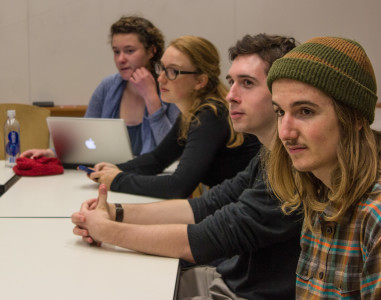
After months of meetings with Grinnell Dining Services, Grinnell’s Real Food Challenge group is set to meet with President Raynard Kington next week to advocate for the College to sign a commitment to buy at least 20 percent real food annually by 2020.
Grinnell’s Real Food Challenge is an affiliate of the national organization by the same name. The group began after Madeline Warnick ’16 completed an independent study in winter 2013 entitled “Tracking ‘Real Food’ in Grinnell College Dining Services.”
Warnick used the Real Food Calculator, a tool created by the Real Food Challenge to assess the percentage of the Dining Hall budget that went to the purchase of “real food.” Food that is “real” fits within one or more of the following categories: local, fair, ecologically sound and humane. A food is disqualified if it comes from Concentrated Animal Feeding Operations (CAFOs), or if it contains Genetically Modified Organisms or antibiotics.
Warnick’s research showed that only seven percent of the Dining Hall’s budget in September and April of 2012-2013 was spent on food that qualifies as “real.” According to her report, most of the “real” food purchases are in dairy, eggs and tea/coffee (23 percent, 92 percent and 19 percent real, respectively). This number is significantly lower than Grinnell’s peer institutions, with Macalester College buying 20 percent real food and Carleton College buying 23 percent.
After completing her research, Warnick put out a call for student help in Spring 2014. Rosie O’Brien ’16, a current co-leader of the group, was among the students to join last year.
“We started brainstorming how we could continue to meet with Dining Services, how to eventually meet with the President and other administrators, and how to gain more student involvement,” O’Brien said.
Unlike many colleges and universities around the country, Grinnell Dining Services is self-operated, meaning that Dining Hall management is not outsourced to an external company. Consequently, the College is not under contract to buy food from specific places. Despite this flexibility, Warnick’s report found that Dining Services purchases 75 percent of its food through Sysco, the largest food distributor corporation in the world.
In an effort to spread the word and make changes, students from Grinnell’s Real Food Challenge formed student and administrative outreach groups. Co-chairs Liana Butchard ’18 and Lucia Tonachel ’18 say that educating students and gathering support is critical to the mission. They have helped to host speakers from groups including Powesheik CARES—a local anti-CAFO group—and have also tabled outside the D-Hall.
“Tabling has let us see the extremes of the student body,” Butchard and Tonachel wrote in an email to The S&B. “We have been met with both enthusiasm and adamant opposition.”
The administrative outreach group began meeting with Dining Services last year.
“Over the course of our meetings, we’ve asked Dick Williams, Director of Dining Services, to help us assess alternative producer and cost lists to see what specific products would cost if we changed their sourcing,” O’Brien said. “And they said that they don’t currently have enough resources in the budget to make all the purchases.”
Next week, the group will meet with President Kington directly.
“Our next step is to ask the administration to support a budget increase,” O’Brien said. “We’re also asking the College to sign the official Real Food Campus Commitment.”
The group’s first priority is to reduce the College’s consumption of CAFO meat.
“We buy so much CAFO meat as an operation,” O’Brien said. “And there are a lot of sources for humanely raised meat around us.”
The group says they are aware that there are budgetary limits to buying real food, but they point out that colleges with smaller endowments than Grinnell have a higher percentage of real food purchases, and the potential benefits to signing the commitment go beyond simply supporting ethically- and sustainably-sourced food. It would also attract prospective students who are concerned about food ecosystems and the intersections between food justice and environmental and social causes.
Students interested in getting involved with Grinnell’s Real Food Challenge can attend their meetings on Wednesdays at 8 p.m. in JRC 226.




























































